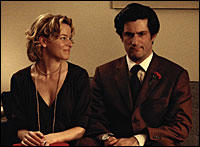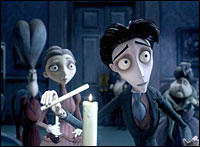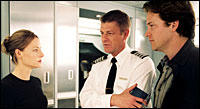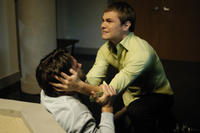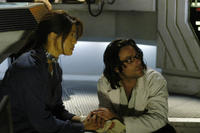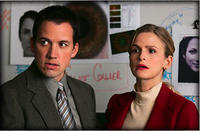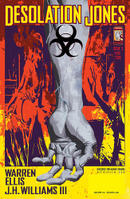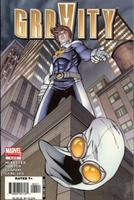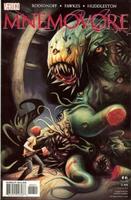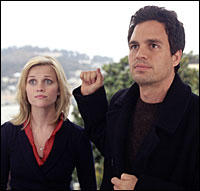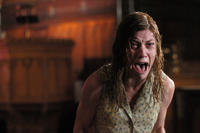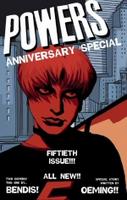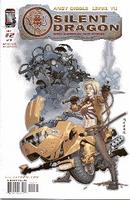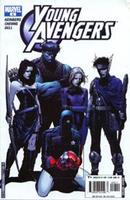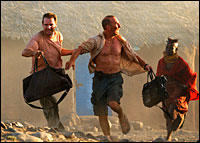Some of these are holdovers from last week that were late shipping to my local store.
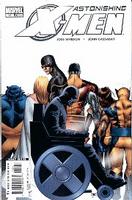 Astonishing X-Men #12 (Joss Whedon/John Cassaday, Marvel)
Astonishing X-Men #12 (Joss Whedon/John Cassaday, Marvel)The arc wraps up mostly without redeeming itself, and it's too bad, because the first six issues of this title were great, and the next six were marred by cliched plotting and extreme lateness. At least the dialogue is still very sharp and,
as Paul O'Brien noted, Cassaday could illustrate the phone book and it'd be worth reading. But I really think that Whedon could have come up with something more original and exciting than "the Danger Room comes alive and fights the X-Men" to focus on for six issues. The cliffhanger that sets up the next arc is sort of intriguing, but it's also a fairly familiar storyline. Plus we'll have to wait four months to find out if Whedon can turn it into something interesting. That said, this is still leagues ahead of the other core X-books, and even if it's sometimes disappointing, it's also the strongest take on the X-Men since Morrison left, so I'll certainly keep reading.
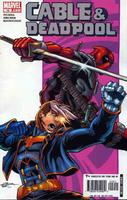 Cable & Deadpool #19 (Fabian Nicieza/Patrick Zircher, Marvel)
Cable & Deadpool #19 (Fabian Nicieza/Patrick Zircher, Marvel)A sort of palate-cleansing issue between storylines, with Deadpool and Cable sitting in a bar, chatting about their childhoods. A little too serious for this book, I think, which is best when it's a goofy action-adventure, not a psychoanalysis of the lead characters. There were still some good lines, but it did feel like a placeholder issue, and I'm looking forward to some campy fun next issue with the new storyline.
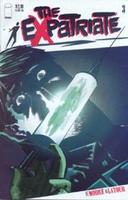 The Expatriate #3 (B. Clay Moore/Jason Latour, Image)
The Expatriate #3 (B. Clay Moore/Jason Latour, Image)Whoa. That was unexpected. I was mildly intrigued by the first two issues of this book, which were a little confusing but presented a stylish, fast-paced spy adventure with a man on the run from the CIA in the 1960s. Latour's art has a sort of classic thriller look to it, and the concept had promise. This issue starts with the hero in France after fleeing Mexico in the last issue, but it soon takes a strange turn, as he's captured by his pursuers and (spoiler alert) beheaded and offered up to some alien/robot thing. Yeah. So I was a little surprised by that, which is cool, I guess, but it changes the whole premise of the book into one I'm not sure I want to read. I had pretty much the opposite reaction to
Randy Lander. I mean, I
liked the stylish 1960s international spy thriller. I don't know about some weird sci-fi book, but I'll give it at least another issue to see where it's going. It just seems odd to me that, if you are going to have a twist that so jarringly alters the direction of the series, why you would wait until the end of the third issue. Anyone who would have liked the sci-fi book has long forgotten that this series even exists, and anyone (like me) who's been picking it up for what it was billed as may be feeling a little cheated. Especially since it hasn't exactly been shipping on time. If the change had come at the end of the first issue, I would have felt like I could either keep reading or not knowing what the book was about. But now I do feel a little like the rug has been pulled out from under me, and not necessarily in a good way.
 Fell #1 (Warren Ellis/Ben Templesmith, Image)
Fell #1 (Warren Ellis/Ben Templesmith, Image)Now this is the Warren Ellis I remember. Of the three new ongoing series Ellis has launched in the last few months, this is far and away the best. It's interesting that one of the people who popularized decompressed storytelling has come up with a book that tells a complete story in each issue and packs a huge amount of content into only 16 dense pages. I didn't even realize that the story was shorter, page-wise, than a normal comic until I read about it in the little essay at the back. Templesmith works well in the rigid nine-panel grid that Ellis has set up, retaining his weird, sometimes abstract style while telling a clear story that's easy to follow. Ellis also sets up a concept that has plenty of potential, with a seemingly normal police detective coming to work in a sort of magical realist city known as Snowtown, which teeters on the edge of the supernatural but never quite falls in. Although this issue does indeed tell a complete story, there's obviously an ongoing narrative as well, making this easily the most intriguing opening of an Ellis series in quite some time.
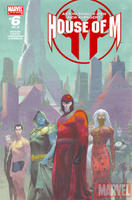 House of M #6 (Brian Michael Bendis/Olivier Coipel, Marvel)
House of M #6 (Brian Michael Bendis/Olivier Coipel, Marvel)Even when things happen in this book, it feels like nothing is happening. In this issue, the heroes team up to go to Genosha and confront Magneto. Everything proceeds exactly as you'd expect, with no surprises, not even the supposed twist at the end. I'm waiting for there to be some big revelations or world-changing consequences, but the story's almost over and there's nothing. Coipel's art is still very nice and Bendis gets in some decent character moments, but the only way I could imagine this being remotely interesting is if they condensed it to half the length and completely did away with all the hype about it being a big important event.
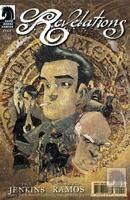 Revelations #1 (Paul Jenkins/Humberto Ramos, Dark Horse)
Revelations #1 (Paul Jenkins/Humberto Ramos, Dark Horse)This was much more of a traditional murder mystery than I expected, given its Vatican setting. I suppose more of the religious themes will come out in future issues, but for now I like them in the background. It plays like a decent mystery novel, but Ramos's experimental style is kind of off-putting. His regular manga-influenced, cartoony, kinetic style probably wouldn't be appropriate, but this more serious style still has all the characters looking like children with growth disorders. I'm unsure about this, but I'll probably keep reading because I like Jenkins and it's been too long since he's written anything that I've had any interest in.
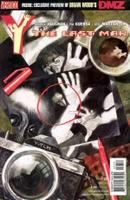 Y the Last Man #37 (Brian K. Vaughan/Pia Guerra, DC/Vertigo)
Y the Last Man #37 (Brian K. Vaughan/Pia Guerra, DC/Vertigo)Vaughan throws in a great twist at the end of this issue that really ups the stakes for this series, and after three years of Yorick running around in secret, makes a whole lot of sense. After last issue's dense history of Yorick and Beth's relationship, their quest for reconciliation is sort of side-tracked in this issue, but the side track is actually more interesting, and I'm looking forward to seeing how it all comes together.
 The Middle Man #2 (Javier Grillo-Marxuach/Les McClaine, Viper)
The Middle Man #2 (Javier Grillo-Marxuach/Les McClaine, Viper)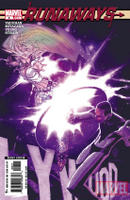 Runaways #8 (Brian K. Vaughan/Takeshi Miyazawa, Marvel)
Runaways #8 (Brian K. Vaughan/Takeshi Miyazawa, Marvel)